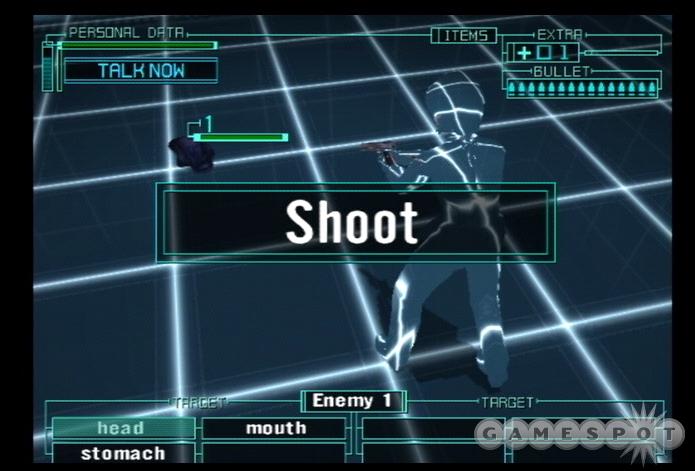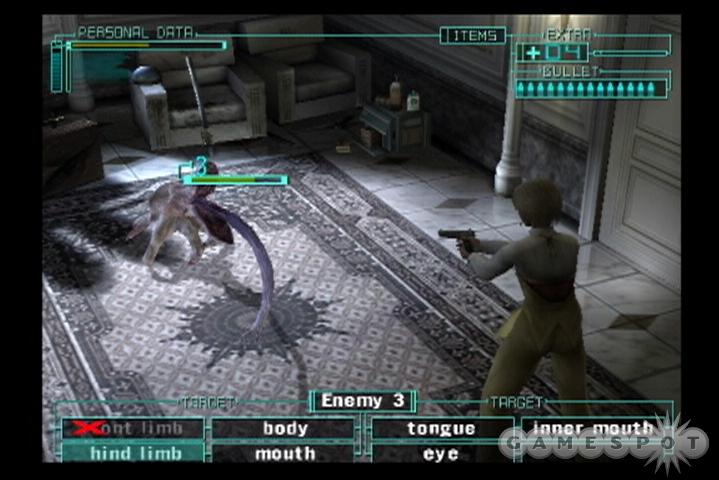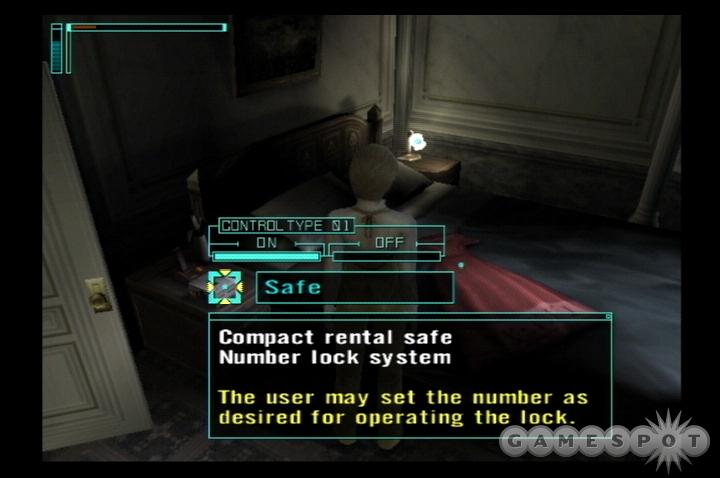LifeLine Preview
Konami traps you in space on the PlayStation 2. Your only hope? A perky blond girl.
LifeLine is the upcoming "voice action adventure" game from Konami that requires you to use the PlayStation 2's USB headset. The game was released last year to some acclaim in Japan, under the title Operator's Side, and is now on its way to the US. We got our first look at an early version of the game last year and have since been able to try out a much more complete version of it. The near-final version of the title was fully localized and let us get a feel for what to expect when the final version ships.

The game's story is set in the year 2029 and takes place on a hotel space station that's seen better days. A strange attack leaves the station in a mess, and a whole lot of people in attendance are left either dead or in a bind. As the player, you'll fall into the "in a bind" category as you soon discover that you're trapped in the station's main control room. That's right--as the person at the controls, you're actually a character in the game. Thankfully, all is not lost, thanks to your discovery of another survivor--a young woman named Rio. While Rio is also in a bind, when you first meet her she's trapped in a holding cell. The one perk of being trapped in the main control room is the ability to access security cameras and computer systems on the ship. As a result, you can help Rio get through the station to reach the main control room so that she can free you. And so starts the beginning of an unlikely partnership that forms the core of LifeLine.
LifeLine's story focuses on more than just guiding Rio to get you out of the control room. Both of you have lost track of friends during the attack and hope to find them as she explores the ship. As you guide Rio through the ship, another important plot point unfolds. It becomes clear that something has gotten loose on the station--something alien and very deadly--and you'll have to discover more about it if you want to survive. These plot points are complemented by shorter subquests that you'll encounter, which help keep the game's pace moving along at a good clip.
The game's structure unfolds deliberately and in a pretty linear fashion. Your time will be spent guiding Rio through the hotel and through the various guest rooms in search of useful items or people to talk to. You'll collect different items, including some that restore your health and others that are required to get past the many locked doors you'll encounter. In addition, you'll solve different puzzles and engage in combat with the mutated creatures on the space station.

LifeLine's gameplay relies heavily on the USB headset and your direction of Rio, which is both good and bad. The voice-recognition technology used in the game is quite impressive and recognizes more than 5,000 words and 100,000 phrases, such as "Shoot!" and "Run!" When exploring the station, the voice interaction works well. For instance, you'll enter rooms, and you'll be cued as to what items and areas you can interact with by calling up a map of the room with the L1 button. You'll have to guide Rio to various spots in the room and try to identify what's in front of her so that you can have her interact with it. For example, if you come to a table with items on it, you'll have to help Rio identify the items before you can tell her to "Check the notes." or "Check the wine." The whole process is fairly methodical, thanks to the robust voice recognition.
If you can't cue Rio in on an item by name, you can also direct her to it by describing it. For example, you can tell her to "Check the green bottle." if you can't get her to recognize it as a wine bottle. However, when exploring the ship, you won't just have to rely on Rio. Your ability to access systems on the space station will let you manually unlock doors and open safes (provided Rio's found the combination) by using the square button. In other cases, you and Rio will have to work together. One puzzle requires you to read a phrase at the same time Rio does, while another simply requires you to do a bit of word association until she figures out which weapon she wants to make.
Your time in LifeLine isn't just about talking to Rio and unlocking doors for her. As we mentioned earlier, the station has more than a few new residents who are pretty deadly, which means that Rio will also be doing her fair share of killing. You'll have to direct her in battle by issuing orders, the mechanics of which work well. You'll be able to stack up to three commands, which Rio will execute in order, such as "Head, shoot, reload." These commands can be essential for staying alive. When facing more than one enemy, you'll be able to target them specifically by calling out the numbers above their heads. You'll even be able to target specific parts on them. For example, when facing three enemies, you can say, "One, head, shoot."; "Two, stomach, shoot."; and "Three, dodge, shoot." to tangle with all of them. For small groups of one to two foes, the system works pretty well, but for more than two enemies--especially if one is behind you and one is in front of you--it gets to be a little clunky. However, despite occasionally being clunky, battles are never really impossible.

In addition to the above uses for voice, LifeLine squeezes a bit more out of the mechanic, thanks to the inclusion of a bonus option that opens up as you progress through the game. You'll notice that Rio collects chips on her travels through the ship. These chips can be used in the bonus game, once you've had the game load your save. The chips unlock different minigames that you can play, such as a word jumble or a quiz on capitals. While they're most definitely goofy, the minigames are a fun diversion.
The graphics in the game are detailed, although they have a sterile look that fits the setting. The space station is a mishmash of traditional-looking hotel rooms, more-utilitarian industrial areas, and other expansive environments. The detailed environments offer a nice sense of scale, although we would have liked to have seen more than the limited interaction the game offers. The character models look good enough; they're made up of a fair amount of polygons and have a decent amount of detail. However, they aren't terribly impressive. The alien creatures fare better, thanks to creepy designs and animation. While you'll encounter many cinematic sequences that use the game's graphics engine, you'll also find some CG on hand to highlight bigger story sequences.
The game's audio is solid, albeit somewhat inconsistent. While Rio sounds fine, thanks to the presence of She Spies' Kristen Miller, some of the other character's you'll interact with are throwbacks to the cheesy voice acting heard in original PlayStation games. The sound effects work pretty well, but the ship is a little too quiet, which certainly works the creepy angle in the game. The unearthly screeches from the creatures you encounter are definitely weird. Rio's gun sounds appropriately menacing, as do the ricochets of its bullets. The music in the game is a slightly bizarre blend of atmospheric, minimalist pieces and battle music that sounds like it would fit into the latest edition of Dance Dance Revolution.
From what we've played so far, LifeLine is an interesting game that manages to offer more than just a novel experience that's tied to the gimmick of the headset. The game's story is engaging, the graphics are strong, and the gameplay, despite its rough spots, presents an interesting change of pace. The inclusion of the minigames helps the game from getting too boring, which is good. Anyone looking for a decidedly different game, who doesn't want to try to command a polygonal woman to get naked (it's not gonna happen, people, so just deal), should definitely keep an eye out for LifeLine when it ships this March for the PlayStation 2.
Got a news tip or want to contact us directly? Email news@gamespot.com
Join the conversation